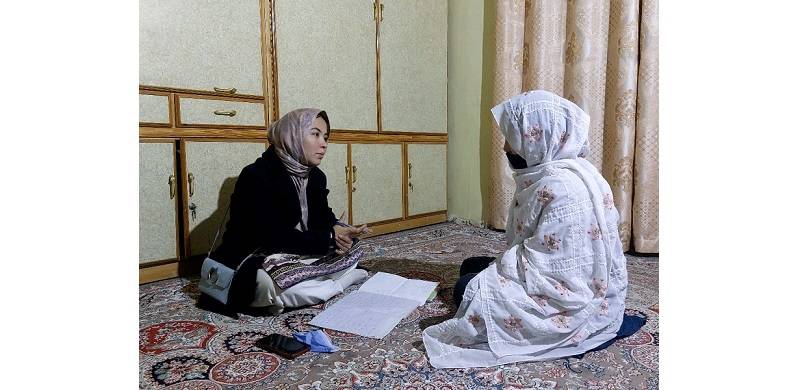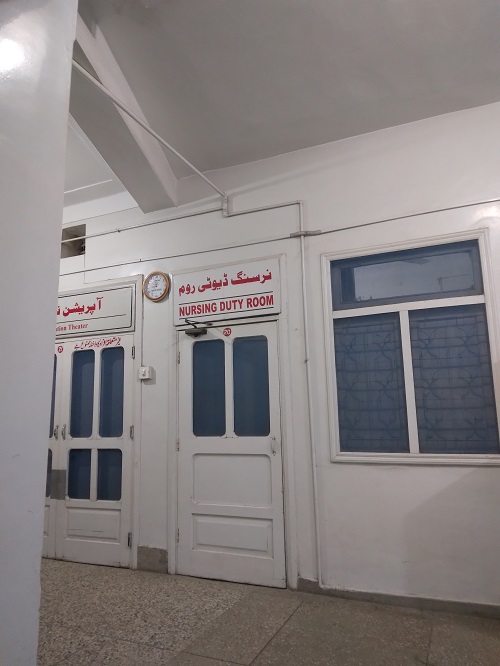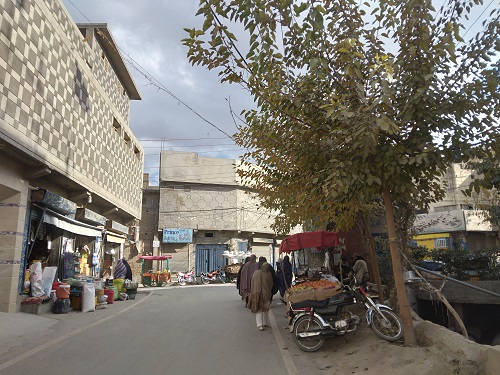
It is a dark wintery night. She covers her face and clutches her purse after separating the money in her palm for her rickshaw fare after completing her daily work as a "nurse" by practice. And now she is getting ready to leave for her home.
Laila, 25, is young, energetic and confident girl dodging all the odds. Society calls her a "migrant." She works for night shifts in one of the hospitals in Quetta. All the more, she is "a Hazara girl.”
 She hasn't completed the education needed for nursing. Her parents settled in Quetta due to the post-Soviet conflict in her homeland. She was young and went to school as a child, but Pakistani state policies are such that migrants don't have the necessary facilities and equal rights for education.
She hasn't completed the education needed for nursing. Her parents settled in Quetta due to the post-Soviet conflict in her homeland. She was young and went to school as a child, but Pakistani state policies are such that migrants don't have the necessary facilities and equal rights for education.
She managed to complete her matriculation when there was still a way to do it, and documents were not electronic, nor were NADRA records needed.
"I should not bow before the man-made restrictions, I should work on for myself, the society and get a wage for survival," says Laila.
"They'll name me just an Afghan migrant, a girl working in hospital for late hours, but I damn care, as long as I serve society through the skills I have gotten practically – from bandages, washing the wounds and operation scars to working with surgeons in the operation theatre, helping them.”
Laila is the only sister of four brothers. The family lives in Meherabad, a locality with a large Hazara population. Her father is too old to work and suffers from epilepsy. Her elder brother is married and the rest are living their own life as working boys. Taking care of the family and working, Laila is a role model for other girls, as she is practically contributing as nurse in one private hospital since 2016.
Her salary is 15,000 rupees per month, but with that meagre amount she helps in her home by contributing to the rent, paying utility bills or sometimes buying the medicines needed by her father. Laila says the ability to contribute this way helps motivate her.
As a nurse she can efficiently perform stitching of wounds and can give injections to patients. She has also learnt how to efficiently handle the tasks of a nursing assistant in the labour room and emergency department. Sometimes she visits the patients at their homes, as some have difficulty walking and might need emergency treatment through a nurse.
“Even though I often hear negative comments from society and relatives, they don't know that I am serving humanity. Whatever I do is a noble profession, so I do not care what people say. The biggest challenge is living as refugee girl in Pakistan. As refugees, we are never valued in any place or sector. Neither can we avail a good job. Due to incomplete legal documents, many good employers rejected me.”
Yet her efforts are not limited to the workplace. She has volunteered to help flood-affected people in the local community and in faraway Hazara Town in the capital city of Balochistan. As part of the post-flood efforts, she also helped to care for patients who couldn't pay for healthcare.
She adds: “The refugees are cursed by the people, they're looked down upon as lesser humans, even in their local community. And it doesn’t end with the refugee status! After that, the society will judge you as a woman, as a working nurse."
Laila, 25, is young, energetic and confident girl dodging all the odds. Society calls her a "migrant." She works for night shifts in one of the hospitals in Quetta. All the more, she is "a Hazara girl.”
 She hasn't completed the education needed for nursing. Her parents settled in Quetta due to the post-Soviet conflict in her homeland. She was young and went to school as a child, but Pakistani state policies are such that migrants don't have the necessary facilities and equal rights for education.
She hasn't completed the education needed for nursing. Her parents settled in Quetta due to the post-Soviet conflict in her homeland. She was young and went to school as a child, but Pakistani state policies are such that migrants don't have the necessary facilities and equal rights for education.She managed to complete her matriculation when there was still a way to do it, and documents were not electronic, nor were NADRA records needed.
"I should not bow before the man-made restrictions, I should work on for myself, the society and get a wage for survival," says Laila.
"They'll name me just an Afghan migrant, a girl working in hospital for late hours, but I damn care, as long as I serve society through the skills I have gotten practically – from bandages, washing the wounds and operation scars to working with surgeons in the operation theatre, helping them.”
Laila is the only sister of four brothers. The family lives in Meherabad, a locality with a large Hazara population. Her father is too old to work and suffers from epilepsy. Her elder brother is married and the rest are living their own life as working boys. Taking care of the family and working, Laila is a role model for other girls, as she is practically contributing as nurse in one private hospital since 2016.
Her salary is 15,000 rupees per month, but with that meagre amount she helps in her home by contributing to the rent, paying utility bills or sometimes buying the medicines needed by her father. Laila says the ability to contribute this way helps motivate her.

As a nurse she can efficiently perform stitching of wounds and can give injections to patients. She has also learnt how to efficiently handle the tasks of a nursing assistant in the labour room and emergency department. Sometimes she visits the patients at their homes, as some have difficulty walking and might need emergency treatment through a nurse.
“Even though I often hear negative comments from society and relatives, they don't know that I am serving humanity. Whatever I do is a noble profession, so I do not care what people say. The biggest challenge is living as refugee girl in Pakistan. As refugees, we are never valued in any place or sector. Neither can we avail a good job. Due to incomplete legal documents, many good employers rejected me.”
Yet her efforts are not limited to the workplace. She has volunteered to help flood-affected people in the local community and in faraway Hazara Town in the capital city of Balochistan. As part of the post-flood efforts, she also helped to care for patients who couldn't pay for healthcare.
She adds: “The refugees are cursed by the people, they're looked down upon as lesser humans, even in their local community. And it doesn’t end with the refugee status! After that, the society will judge you as a woman, as a working nurse."

